Top Ten Tuesday was created by The Broke and the Bookish in June of 2010 and was moved to That Artsy Reader Girl in January of 2018. It was born of a love of lists, a love of books, and a desire to bring bookish friends together.
Previous Top Ten Tuesday Topics
- 20th December: Books I Hope Santa Brings This Year
- 27th December: Most Recent Additions to My Book Collection
- 3rd January: Favourite Books of 2022
- 10th January: Most Anticipated Books Releasing in the First Half of 2023
- 17th January: Bookish Goals for 2023
This week is a freebie week and I am in the midst of listening to Northanger Abbey by Jane Austen, her first novel and written around 1798, albeit not published until after her death. It is part of my half-formed intention – a vague idea and inclination perhaps – to try to re-read Austen, returning to an author that I did not gel with as a teenager at university. Certainly, it is much funnier and more wry than I remembered Austen to be. Which bodes well.
Anyway, the point of this preamble is that I love the way Catherine Morland becomes obsessed with The Mysteries of Udolpho, by Ann Radcliffe – to the extent that she would prefer to curl up at home with the novel than venture out into Bath’s social scene, has limited conversation save for her love of the novel, and is desperate for her life to emulate the thrills and passions of the novel. So I thought I’d use this as a springboard to explore bookworms in fiction.
And for this one, I am going to try to limit myself to readers of real-world novels, the books you and I can pick up and read too!
Catherine Morland, Northanger Abbey, Jane Austen
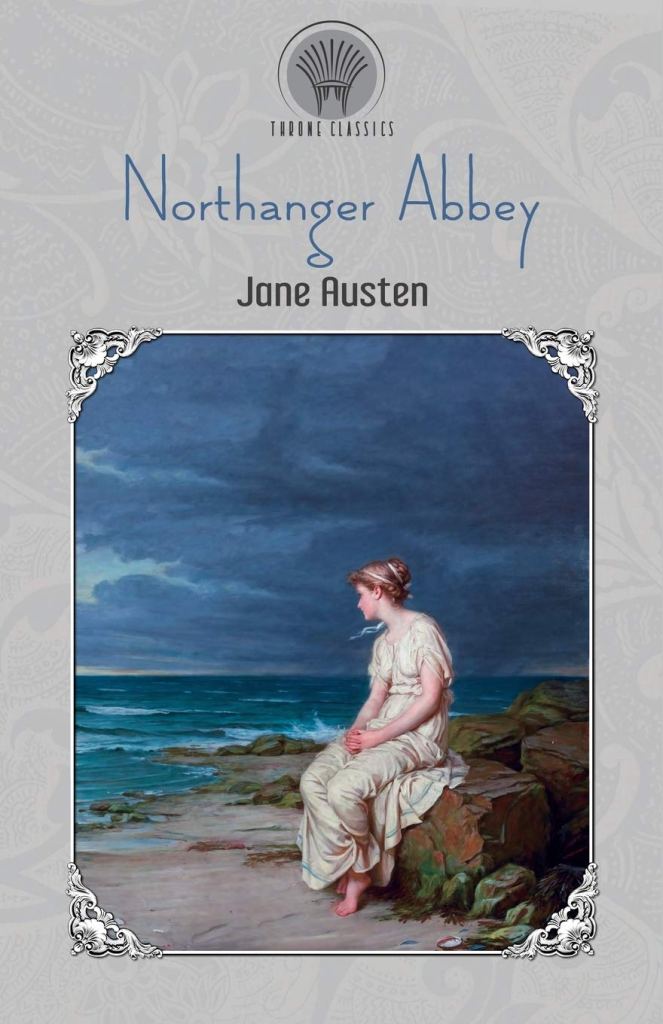
With its irrepressible heroine and playful literary games, Northanger Abbey is the most youthful and optimistic of Jane Austen’s novels. It tells the story of young, impressionable Catherine Morland, whose first experience of fashionable society introduces her to the thrills of Gothic romances, and to the sophisticated Tilneys, who invite her to their family home, Northanger Abbey. But there, influenced by novels of horror and intrigue, Catherine begins to think that terrible crimes are being committed, and her imagination threatens to run away with her.
The person, be it gentleman or lady, who has not pleasure in a good novel, must be intolerably stupid.
Jane Eyre, Jane Eyre, Charlotte Bronte
“Jane Eyre” is the tale of its title character, a poor orphaned girl who comes to live with her aunt at Gateshead Hall. While there she endures great emotional and physical abuse at the hands of her aunt and cousins. Jane subsequently ships off to Lowood, a Christian boarding school for poor and orphaned girls. The conditions at the school are quite brutal. The students are subjected to cold lodgings, poor food, inadequate clothing, and the harsh rule of the administrator, Mr. Brocklehurst. The maltreatment of the students is eventually discovered and after some changes life becomes more bearable. She eventually finishes her coursework and spends a period of time as a teacher at the school. After leaving Lowood she gains a position as a governess at Thornfield Hall working for Edward Rochester, a man whom she will eventually fall in love with. “Jane Eyre” is the story of one woman’s struggle to overcome adversity.
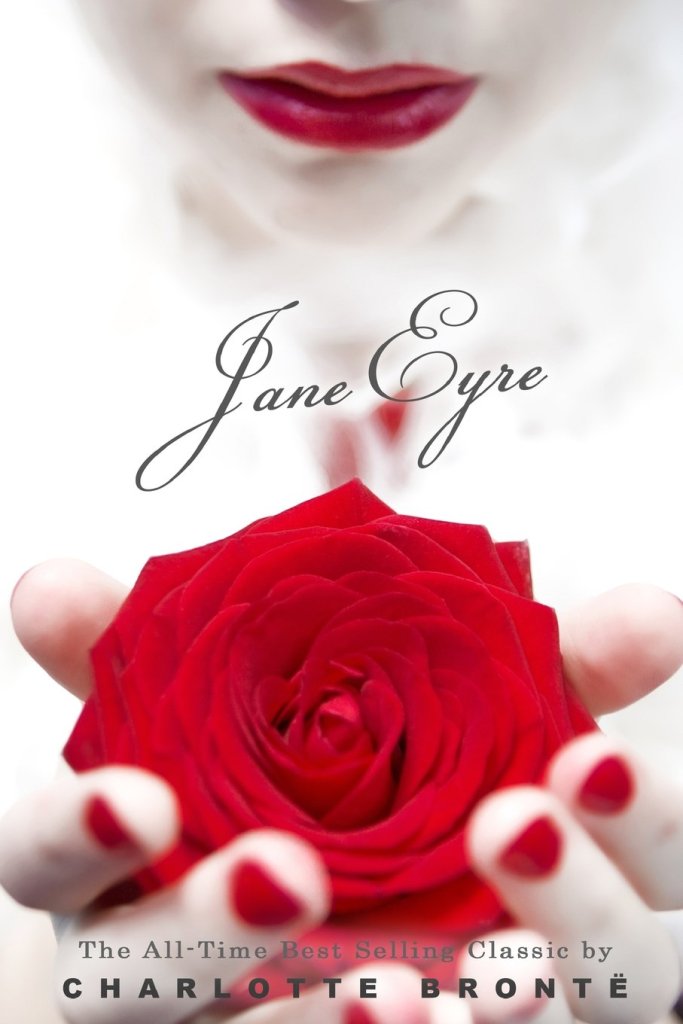
I’m not convinced about the cover here – there is too much red, too much crimson…
That aside, Jane’s recourse to books is a small and understated part of the novel, especially in the opening chapters: neglected and abused by her aunt and odious cousins, how does Jane find peace and freedom? In the pages of Bewick’s History of British Birds where she seeks images of distant lands and foreign climes rather than ornithology.
And after the trauma of the Red Room, where does our heroine seek comfort? In Gulliver’s Travels
I begged her to fetch Gulliver’s Travels from the library. This book I had again and again perused with delight. I considered it a narrative of facts, and discovered in it a vein of interest deeper than what I found in fairy tales: for as to the elves, having sought them in vain among foxglove leaves and bells, under mushrooms and beneath the ground-ivy mantling old wall-nooks, I had at length made up my mind to the sad truth, that they were all gone out of England to some savage country where the woods were wilder and thicker, and the population more scant; whereas, Lilliput and Brobdignag being, in my creed, solid parts of the earth’s surface
It is testament to the extent of her trauma that neither this, her favourite book, nor a delicious tart are enough to calm her.
Matilda Laimo, Mister Pip, Lloyd Jones

Bougainville, 1991. A small village on a lush tropical island in the South Pacific. Eighty-six days have passed since Matilda’s last day of school as, quietly, war is encroaching from the other end of the island.
When the villagers’ safe, predictable lives come to a halt, Bougainville’s children are surprised to find the island’s only white man, a recluse, re-opening the school. Pop Eye, aka Mr Watts, explains he will introduce the children to Mr Dickens. Matilda and the others think a foreigner is coming to the island and prepare a list of much needed items. They are shocked to discover their acquaintance with Mr Dickens will be through Mr Watts’ inspiring reading of Great Expectations.
But on an island at war, the power of fiction has dangerous consequences. Imagination and beliefs are challenged by guns.
There is such a celebration of the power of literature in this novel – its power to spark imagination and curiosity, its power to protect your identity and your soul in horrific times. I do feel a little uncomforatble and the children of Bougainville are shown as being dependent on both a white man’s teaching and a white writer’s writing, even if it is Dickens….
Matilda Wormwood, Matilda, Roald Dahl
Matilda is a brilliant child with a magical mind.
But her parents have decided she’s just a nuisance who wastes too much time on reading and stories.
And her headmistress Miss Trunchbull is a terrible bully, who thinks children are rotten and awful and should be locked up.
Now it’s time for Matilda to find the power to change her story, and show them just how extraordinary children can be . . .
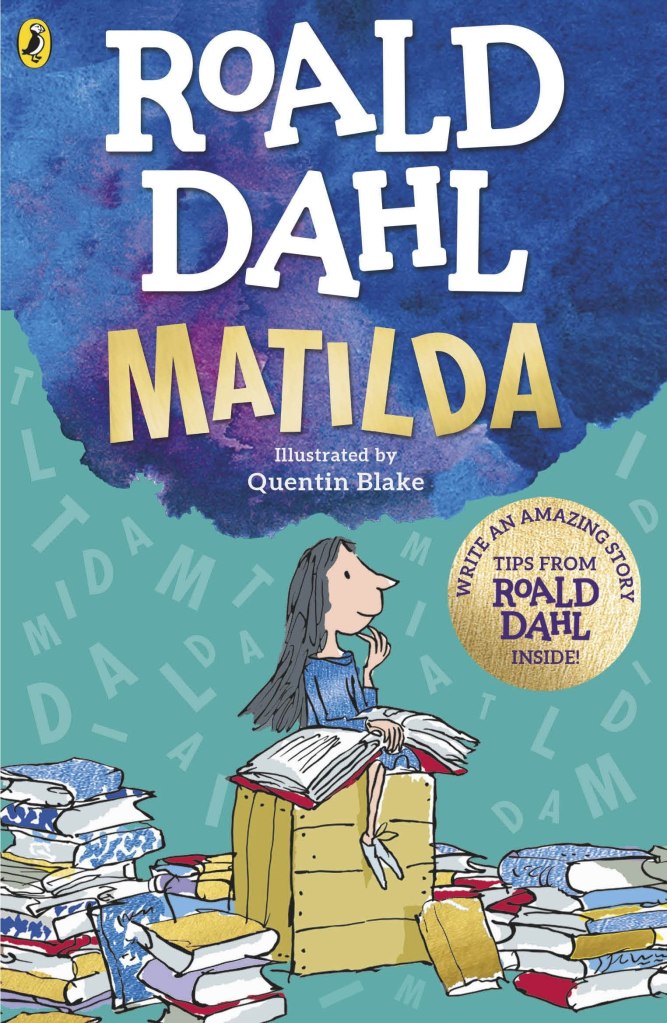
The absolute classic – and I am continually trying to persuade my daughter to read or watch it! What is the quickest way to depict an horrific and neglectful family for this delicate reader’s soul? Show that they have no books and disdain reading…
And the joy Matilda felt when she discovered the library and books is extraordinary
The books transported her into new worlds and introduced her to amazing people who lived exciting lives. She went on olden-day sailing ships with Joseph Conrad. She went to Africa with Ernest Hemingway and to India with Rudyard Kipling. She travelled all over the world while sitting in her little room in an English village.
Her Majesty the Queen, The Uncommon Reader, Alan Bennett
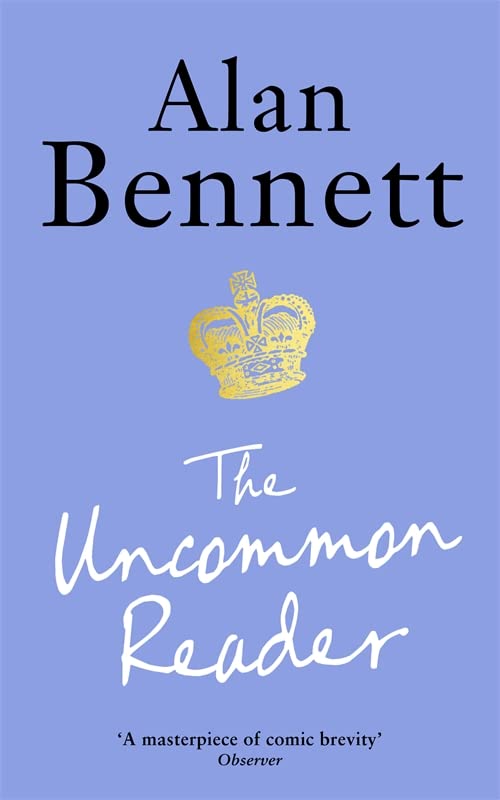
What would happen if the Queen became a reader of taste and discernment rather than of Dick Francis? The answer is a perfect story.
The Uncommon Reader is none other than HM the Queen who drifts accidentally into reading when her corgis stray into a mobile library parked at Buckingham Palace. She reads widely (JR Ackerley, Jean Genet, Ivy Compton Burnett and the classics) and intelligently. Her reading naturally changes her world view and her relationship with people like the oleaginous prime minister and his repellent advisers. She comes to question the prescribed order of the world and loses patience with much that she has to do. In short, her reading is subversive. The consequence is, of course, surprising, mildly shocking and very funny.
This was an extraordinarily gentle and sweet book – never dipping into saccharine or cloying or sentimental – with just the right level of satire and humanity. And with Her Majesty’s recent death even more poignant.
And who can fail to sympathise with Her Majesty discovering that
What she was finding also was how one book led to another, doors kept opening wherever she turned and the days weren’t long enough for the reading she wanted to do.
Thursday Next, The Eyre Affair, Jasper Fforde
There is another 1985, where London’s criminal gangs have moved into the lucrative literary market, and Thursday Next is on the trail of the new crime wave’s MR Big.
Acheron Hades has been kidnapping certain characters from works of fiction and holding them to ransom. Jane Eyre is gone. Missing.
Thursday sets out to find a way into the book to repair the damage. But solving crimes against literature isn’t easy when you also have to find time to halt the Crimean War, persuade the man you love to marry you, and figure out who really wrote Shakespeare’s plays.
Perhaps today just isn’t going to be Thursday’s day.
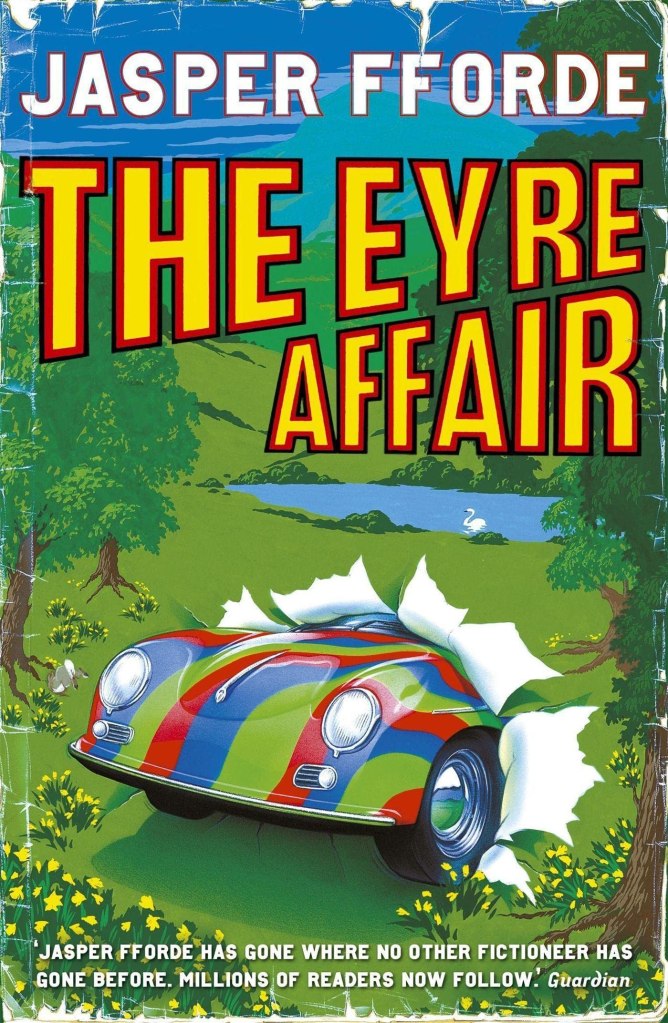
What an absolute riot this series is. Utterly and unashamedly bonkers, but wonderful with dodos, neanderthals, an ongoing Crimean War, riots over Shakespeare – and characters slipping into and out of the pages of books. And of all the novels to slip into, would you choose Jane Eyre, at the moment that we first meet Rochester?
Christopher John Francis Boone, The Curious Incident of the Dog in the Nighttime, Mark Haddon
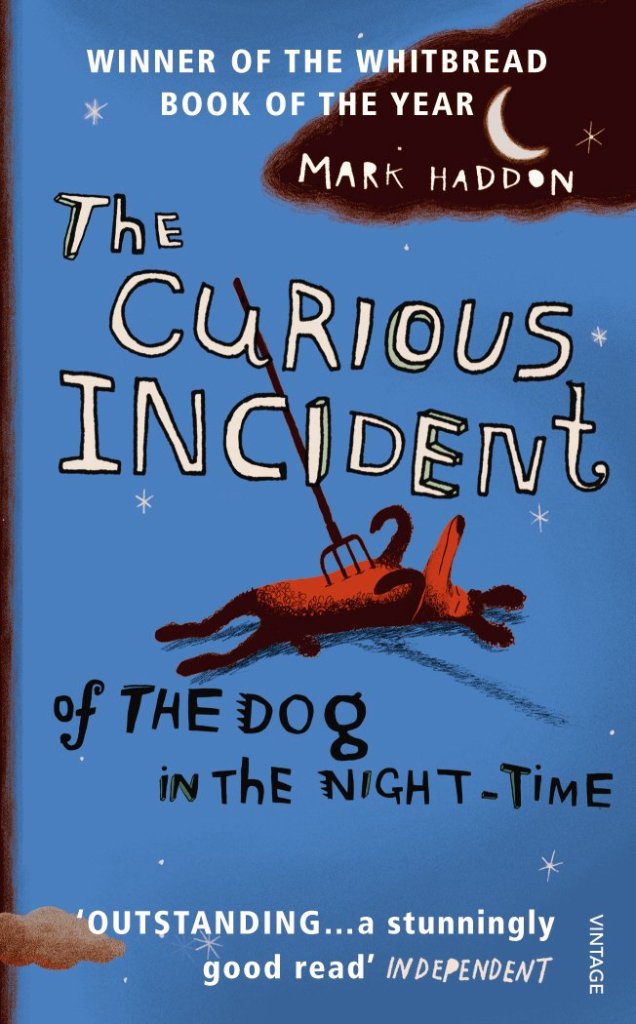
The Curious Incident of the Dog in the Night-Time is a murder mystery novel like no other. The detective, and narrator, is Christopher Boone. Christopher is fifteen and has Asperger’s Syndrome. He knows a very great deal about maths and very little about human beings. He loves lists, patterns and the truth. He hates the colours yellow and brown and being touched. He has never gone further than the end of the road on his own, but when he finds a neighbour’s dog murdered he sets out on a terrifying journey which will turn his whole world upside down.
It has been a long time since I read this and I recall enjoying it, but I am nervous about revisiting it as a parent to an autistic child…
But the novel was replete with references to Holmes novels. Obviously the title is from Silver Blaze and Christopher sees himself in Hoilmes:
I also like The Hound of the Baskervilles because I like Sherlock Holmes and I think that if I were a proper detective he is the kind of detective I would be. He is very intelligent and he solves the mystery and he says
The world is full of obvious things which nobody by any chance ever observes.
But he notices them, like I do. Also it says in the book
Sherlock Holmes had, in a very remarkable degree, the power of detaching his mind at will.
And this is like me, too, because if I get really interested in something, like practicing maths, or reading a book about the Apollo missions or great white sharks, I don’t notice anything else…
Anthony Horowitz, The Sentence is Death, Anthony Horowitz
‘You shouldn’t be here. It’s too late…‘
These were Richard Pryce’s last words, overheard moments before the celeb divorce lawyer was bludgeoned to death with a £3,000 bottle of wine.
Strange circumstances pile up. Pryce was teetotal, so why this bottle? Why those words? Why did the killer paint a number on his wall? And, most importantly, which of the man’s many, many enemies did the deed?
Baffled, the police are forced to bring in Private Investigator Daniel Hawthorne and his sidekick, the author Anthony, who’s really getting rather good at this murder investigation business.
But as Hawthorne takes on the case with characteristic relish, it becomes clear that he, too, has secrets to hide. Anthony knows they must be exposed – even at the risk of death…

These are a twisty and fun series of books and with the author starring in his own novels is strange enough, and I loved the little snippets of a writing life – Horowitz’ interrupted meeting with Steven Spielberg as he tries to bring Tintin to the screen was wonderful. This, the second book was heavily influenced by Holmes – and of course Horowitz has written some new Holmes stories – and Horowitz laments that
I should have been the one to know all this, not Hawthorne. I was the one who had written about Sherlock Holmes. His shadow had been there the whole time. I’d even spent a whole evening talking about the books. But maybe because they were written more than a century ago, I hadn’t seen their relevance to the case we were pursuing.
Simon Serrailler and Cat Deerborn, the Simon Serrailler series, Susan Hill

PEOPLE ARE GOING MISSING. ONLY ONE THING LINKS THEIR CASES.
THEY ALL DISAPPEAR ON THE HILL.
A woman vanishes in the fog up on the Hill in Lafferton. The police have one lead – a pair of expensive cuff-links found in her flat, with a mysterious note attached to them.
Then a young girl, an old man and even a dog disappear in quick succession in exactly the same place.
Young policewoman Freya Graffham and Chief Inspector Simon Serrailler are given the task of unravelling the mystery. But can they find the Hill killer before he strikes again?
This is a strangely compelling series that hovers between the traditions of a police procedural and something that is almost a soap opera and we are alternately charmed and appalled by the Serrailler family.
Because Susan Hill takes seriously the idea that a writer should torment her characters and the Serrailler family have had a terrible time: the family includes catastrophic disability, and characters who are overbearing, murderous, murdered, rapist, abused, and terminally ill; there are deaths due to age, grief, violence and cancer. And Simon Serrailler, for all that he is an absolute shit to almost every woman in his life – except perhaps his beloved sister, Cat – does have one redeeming factor: he is a reader, even if it is usually referenced when he is unable to sit and read because he is wound up! Cat is more likely to actually be seen reading!
Upcoming Top Ten Tuesday Themes
January 31: Freebie
February 7: 2023 Debut Books I’m Excited About
February 14: Love/Valentine’s Day Freebie
February 21: Favorite Heroines
February 28: Genre Freebie (Pick a genre and build a list around it. It could a list of favorites, a to-read list, recommendations for people interested in reading books in that genre, “if you like this, try this”, etc.)



What a great topic. I’ve only read Jane Eyre, on this list.
LikeLiked by 1 person
Love your choice of topic! I’m always a fan of reading about bookworms. 🙂 It makes them super easy to relate to. I really need to read The Curious Incident of the Dog in the Night-Time!
Here’s my TTT post.
LikeLiked by 1 person
I love when characters are readers. Luckily, since I read a lot of romance, many are!
LikeLiked by 1 person
I adore Northanger Abbey. Glad you’re giving Austen another go. She’s not for everyone, though I’ve always enjoyed her books.
LikeLiked by 1 person
I love it when a character gets obsessed with a book. It’s relatable because I get obsessed with them too. 🙂
LikeLiked by 1 person
Fascinating choices! I haven’t read Jane Eyre since my teens (a looong time ago), and haven’t read any of the others, but there are several I will be on the lookout for after reading the quotes and your thoughts.
Other fictional readers that jump to mind are Anne Shirley (Anne of Green Gables) and Jo March (Little Women.)
LikeLike
[…] 31st January: Freebie: Fictional Readers […]
LikeLike
[…] 31st January: Freebie: Fictional Readers […]
LikeLike
[…] 31st January: Freebie: Fictional Readers […]
LikeLike
[…] 31st January: Freebie: Fictional Readers […]
LikeLike
[…] 31st January: Freebie: Fictional Readers […]
LikeLike